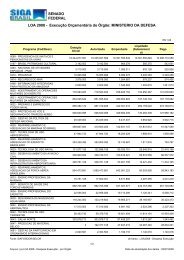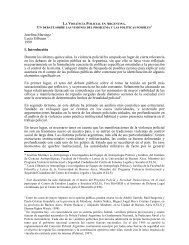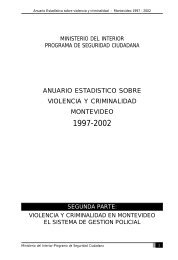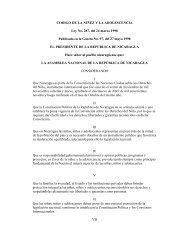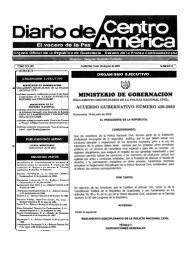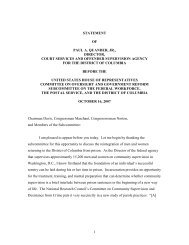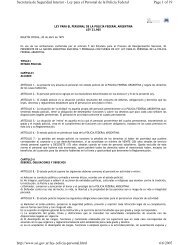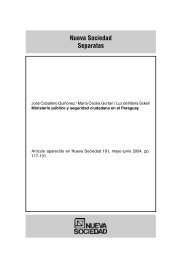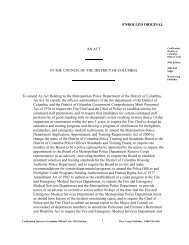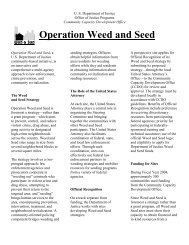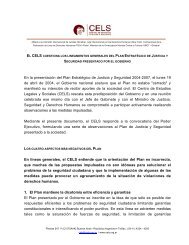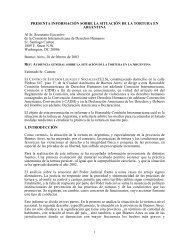Venezuela: The Life and Times of the Party System - Political ...
Venezuela: The Life and Times of the Party System - Political ...
Venezuela: The Life and Times of the Party System - Political ...
Create successful ePaper yourself
Turn your PDF publications into a flip-book with our unique Google optimized e-Paper software.
party-government coherence have both decayed visibly in recent years, with serious implications<br />
for <strong>the</strong> ability <strong>of</strong> ei<strong>the</strong>r <strong>the</strong> executive or <strong>the</strong> congress to act effectively <strong>and</strong> with reasonable<br />
dispatch. Additional problems stem from <strong>the</strong> emergence <strong>of</strong> groups <strong>of</strong> elected <strong>of</strong>ficials whose<br />
claims to legitimacy rest on different <strong>and</strong> somewhat conflicting bases. Governors, mayors, <strong>and</strong><br />
municipal councilors, for example, who are elected by name, contrast <strong>the</strong>ir supposedly more<br />
direct link to <strong>the</strong> people with members <strong>of</strong> congress, elected on closed lists through a proportional<br />
representation system. <strong>The</strong> long-term legitimacy <strong>and</strong> effectiveness <strong>of</strong> <strong>the</strong> democratic system<br />
requires that electoral reform continue until all levels <strong>of</strong> <strong>the</strong> political system operate under<br />
comparable rules.<br />
<strong>The</strong> electorate’s general lack <strong>of</strong> response to new electoral opportunities suggests a<br />
widening communication gap between <strong>the</strong> parties <strong>and</strong> <strong>the</strong> electorate. <strong>The</strong> sudden outbreak <strong>of</strong><br />
intense violence on February 27, 1989 in which all parties saw <strong>the</strong>mselves overtaken by events, 1<br />
as well as <strong>the</strong> sporadic turnout at a series <strong>of</strong> public rallies intended to encourage popular<br />
participation, are evidence <strong>of</strong> a widening gap. This may lead to a situation in which <strong>the</strong> parties,<br />
<strong>the</strong>ir leadership, <strong>and</strong> <strong>the</strong>ir programs become gradually disengaged from <strong>the</strong> population, <strong>and</strong><br />
where reforms are simply added to a set <strong>of</strong> institutions, interests, <strong>and</strong> procedures that are alien to<br />
<strong>the</strong> very people <strong>the</strong>y were created to represent.<br />
<strong>The</strong> fact that proposals for political <strong>and</strong> electoral reform have emerged in a context <strong>of</strong><br />
crisis has important implications for <strong>the</strong> future. On one h<strong>and</strong>, this crisis atmosphere spurs<br />
support for reforms that are widely perceived (at least in <strong>the</strong> political class) as an important ‘cure’<br />
for a set <strong>of</strong> ills. It also reveals a needed capacity for self-critical reflection on <strong>the</strong> part <strong>of</strong> <strong>the</strong> main<br />
actors in <strong>the</strong> political system, as well as an ability for adapting <strong>the</strong> system to new challenges. On<br />
<strong>the</strong> o<strong>the</strong>r h<strong>and</strong>, this critical environment also places high (likely exaggerated) hopes in <strong>the</strong><br />
capacity <strong>of</strong> institutional engineering (including modifications <strong>of</strong> <strong>the</strong> electoral system) to solve<br />
problems whose roots extend well beyond <strong>the</strong> electoral arena. Popular pressure for change may<br />
lead to hasty decision-making, to <strong>the</strong> detriment <strong>of</strong> <strong>the</strong> quality <strong>and</strong> consequences <strong>of</strong> <strong>the</strong> decisions<br />
taken.<br />
<strong>The</strong> <strong>Venezuela</strong>n political system has arrived at a difficult juncture. Reforms already<br />
enacted indicate <strong>the</strong> existence <strong>of</strong> a will to change <strong>and</strong> an important level <strong>of</strong> self-criticism, toge<strong>the</strong>r<br />
with a healthy awareness <strong>of</strong> <strong>the</strong> necessity <strong>of</strong> conserving <strong>the</strong> many positive aspects <strong>of</strong> <strong>the</strong> system.<br />
<strong>The</strong>y also suggest that in spite <strong>of</strong> its serious shortcoming, <strong>the</strong> <strong>Venezuela</strong>n political system is not<br />
‘frozen’ or ‘petrified’ (see Karl 1987 <strong>and</strong> Martz 1982), but instead is demonstrating initiative <strong>and</strong><br />
flexibility for undertaking change leading to a deepening <strong>of</strong> democracy in that country.<br />
1 Two instructive collections <strong>of</strong> articles <strong>and</strong> photographs from El Nacional (a leading Caracas<br />
daily newspaper) are 27 de febrero: Cu<strong>and</strong>o la muerte tomo las calles (Caracas: Editorial Ateneo<br />
de Caracas, 1990) <strong>and</strong> El día que bajaron los cerros (Caracas: Editorial Ateneo de Caracas,<br />
1990).



